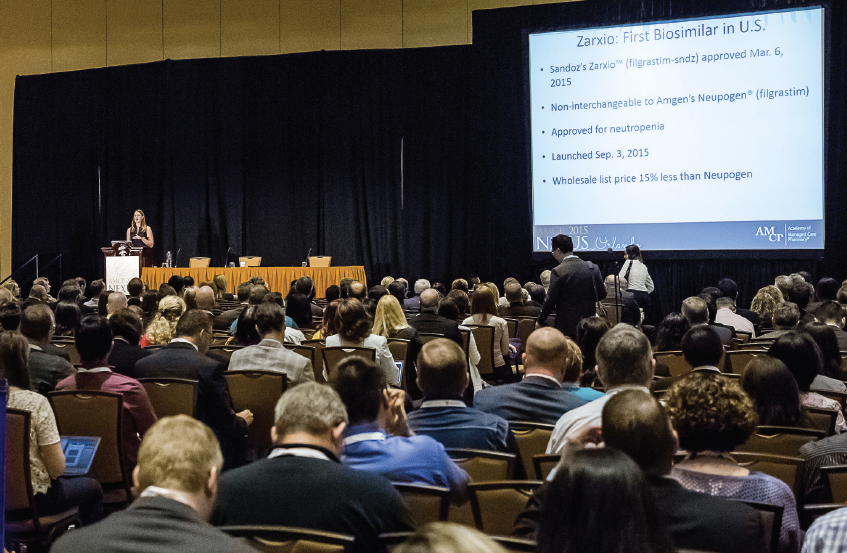ADVERTISEMENT
Breakthrough RA, MS Treatments Among Anticipated Drugs in Specialty Pipeline
 During the AMCP Nexus 2016 meeting, Aimee Tharaldson, PharmD, senior clinical consultant of emerging therapeutics at Express Scripts, outlined the most anticipated specialty treatments likely to receive FDA approval in the coming months, including Ocrevus (ocrelizumab; Genentech) to treat progressive multiple sclerosis (MS) and Aramchol (Galmed Pharmacueticals) for treatment of nonalcoholic steatohepatitis (NASH).
During the AMCP Nexus 2016 meeting, Aimee Tharaldson, PharmD, senior clinical consultant of emerging therapeutics at Express Scripts, outlined the most anticipated specialty treatments likely to receive FDA approval in the coming months, including Ocrevus (ocrelizumab; Genentech) to treat progressive multiple sclerosis (MS) and Aramchol (Galmed Pharmacueticals) for treatment of nonalcoholic steatohepatitis (NASH).
Dr Tharaldson’s presentation highlighted new and emerging specilaity medications in the pipeline, and explained the role each important approval could play in the future of medication therapy. Her presentation also addressed the impact each approval could have on the managed care industry.
The goal of the presentation was to educate managed care professionals to recognize the most noteworthy recently approved medications; identify new specialty medications that are likely to become noteworthy approvals in the near future; and understand the indications, efficacy, safety, and mechanism of action for each of these approvals.
RECENT FDA APPROVALS
Dr Tharaldson opened her presentation, titled “Specialty Pharmaceuticals in Development,” by recapping some of the most recent drugs that have received approval from the FDA. She noted that orphan drugs are popular among recently approved drugs, with most approved drugs falling under the rare disease treatment category. Chief among these drugs is the recently approved Exondys 51 (eteplirsen; Sarepta Therapeutics), for treatment of Duchenne muscular dystrophy (DMD).
Dr Tharalson called the approval of Exondys 51 “The most surprising approval of the decade.” According to her presentation, Exondys 51 is the only approved treatment for DMD, but the FDA approval came after Phase 3 trails failed to show convincing efficacy data. Dr Tharaldson noted that this approval is pertinent to managed care professionals and pharmacy benefit managers because Exondys 51 could account for a net per-patient per-year cost of $325,000, with a gross cost of about $660,000.
PROMISING DRUGS IN THE PIPELINE
Dr Tharaldson noted that over the last decade or so, more specialty drugs have been approved than traditional medications. She said that this trend of increased specialty drug approvals is likely to continue in the future. In order to help pharmacy and managed care experts anticipate how these drugs will impact the landscape of managed care pharmacy and health care in general, she outlined the most important upcoming approvals.
Among some of the pending drug approvals highlighted by Dr Tharaldson, she said that the moderate to severe psoriasis treatment brodalumab (Amgen Inc) may be approved shortly, however, she noted that safety concerns arose during clinical trials. Phase 3 clincal trials of brodalumab found that the drug may increase depression and instances of suicidal ideation. She stated that the drug is very effective, even more so than competitive products like Stelara (ustekinumab; Janssen), but due to safety risks, it will most likely be heavily restricted when it comes to the market.
Of the new rheumatoid arthritis treatments currently in development, Dr Tharaldson highlighted Saracta (sarilumab; Sanofi/Regeneron), which proved to be more effective than Humira (adalimumab; Abbvie Inc) in trials.
Dr Tharaldson also highlighted the treatments for MS currently in development. She emphasized the development of Ocrevus, which will be the first treatment for progressive MS.
“About 15% of patients at diagnosis, are diagnosed with primary progressive MS,” she said. “[Ocrevus] will be the first drug approved for primary progressive MS.”
She noted that Ocrevus is very effective, citing trials that found that the drug reduced disease progression by about 25%. Dr Tharaldson also said that more oral treatments for MS should be coming within the next 2 years.
Dr Tharaldson also highlighted the soft tissue sarcoma drug, olaratumab, which she said “could be approved any day now.” She also noted that the atopic dermatitis treatment, dupilumab, is likely to be approved following extremely positive clinical trials. She noted that annual costs for dupilumab could range from $20,000 to $30,000.
Finally, Dr Tharaldson stated that treatments for NASH will be moving to the forefront of managed care concerns, as the disease is projected to increase in prevalence over the next few years. She stated that NASH treatments will soon account for $35 billion in US health care spending. She noted that most treatments for NASH will not be approved until 2019, but highlighted aramchol as a promising therapy. Dr Tharaldson said that the surge in NASH prevalence is likely due to the disease epidemic, and that right now the best treatments are a healthy diet and exercise. —David Costill




















